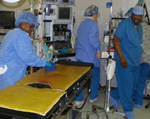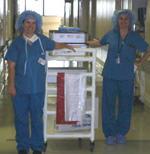Main OR lands nurse magazine's ‘Best Teams’ award
by Dick PetersonPublic Relations
They won the award for Best Teams. Congratulations to the main operating room.
It was great news for Karen Weaver, who sent the award application to Advance for Nurses magazine. It detailed all MUSC’s main operating room personnel had done as a team to improve performance, shorten turnover time and ensure that the patient experience would be less than memorable.
But the real news—Paul Harvey would call it “the rest of the story” —is how they did it.
Three years ago, Weaver, who is Clinical Services director of surgery, women’s and infants services, turned her focus to the Main and Ambulatory ORs.
 Cynthia
Holmes and Marvin Smalls complete the final stage of cleanup in preparation
for the next scheduled surgery.
Cynthia
Holmes and Marvin Smalls complete the final stage of cleanup in preparation
for the next scheduled surgery.
“We had to make some improvements in our turnover time, and we had to have a measurable outcome. I wanted to create incentives, to have the staff work as a team,” Weaver said. Making the team idea a greater challenge was the OR’s retention and recruitment problem. “We had 23 travelers (traveling nurses) and 18 vacancies.”
As it stood, average turnover time— that’s the time between patient out to patient in—was 43 minutes in the Main OR and 21 minutes in the Ambulatory OR. During that time, the operating room is torn down and cleaned from the previous operation and set up for the next. A shorter turnover time would mean more time the OR could be in actual use. More use, more income for the hospital and better service for the patients.
Their charge: Minimize the turnover time and maximize the utilization of the main and ambulatory operating rooms through efficient and effective use of resources. The goal: Reduce the turnover time in the Main OR from 41 minutes and from 21 in Ambulatory OR.
“I told the team, ‘Here’s the goal, the team needs to figure out how to achieve the goal. You’ve got the next two consecutive quarters to reach it,’” Weaver said.
Of course, a charge to create teams and set goals rings a bit hollow without an incentive.
 Tina
Singer, left, and Jane Benzies roll in a cart for the next surgical procedure.
Tina
Singer, left, and Jane Benzies roll in a cart for the next surgical procedure.
“When the quarter goal is reached, each person will receive $500 incentive pay,” Weaver announced to both ORs. Ambulatory took her at her word; Main OR kept a show-me-the-money position until checks were distributed to Ambulatory OR a few months later. Ambulatory had dropped their turnover average from 21 to 19 minutes the first quarter, Weaver said. At the completion of the project the turnover time was reduced from 21 minutes to 12 minutes.
Ambulatory OR’s success as a team made believers of the Main OR staff. They formed a team, examined their processes, identified problems and found solutions. They reduced the original 43-minute turnover time to 32 minutes at the completion of the project. But more than that, they really were a team.
Weaver’s award application spells it out:
“The team excels in initiative,” Weaver said. “After successfully completing the turnover time program, they are now in the fourth quarter of the delay time program to address delays between 2 p.m. and 4 p.m., a problem that was identified in the turnover time program.
“Our team is incredibly flexible and copes well with change and havoc. During the past four years, the operating rooms, PACU, holding rooms, waiting rooms, locker rooms, classroom and front OR desk were all renovated. At some point everyone had to relocate, deal with noise and unanticipated construction problems.” Weaver said that surgeons, anesthesiologist, nurses, nursing support staff, CRNAs, anesthesia support and housekeepers all worked together to provide safe and excellent patient care.
A good team supports its own, and that was evident last year as the main OR team rallied for its nurse manager. He had lost his father, his dog died and other personal pressures were causing difficulty. “The team worked together to raise money to buy him a Sheltie puppy and planned a surprise party for his birthday,” Weaver said. “It left him speechless, and there was not a dry eye in the room.”
In the “above and beyond” category, the team flexes to facilitate patient flow, collaborates with the MUSC College of Nursing, provides a perioperative course for nurses statewide, is active in state and local nursing associations, educates local school students in seat belt safety and drunk driving, and promotes the health care professions in local schools. “Several on our staff volunteer to work in underdeveloped countries including Ukraine, Honduras and countries in Africa. And we participate in the Make-A-Wish Foundation to repair children’s congenital deformities,” Weaver said.
 Following
a surgical procedure Theresa Bowen, Regina Herring and Michael Rossetter
start the cleanup process.
Following
a surgical procedure Theresa Bowen, Regina Herring and Michael Rossetter
start the cleanup process.
“As the team developed, a transition evolved before our eyes. The staff worked diligently recruiting travelers and other staff to the OR. This evolved over a nine-month period, and now all the travelers are gone and the OR is fully staffed with permanent employees, 10 of whom were travelers who converted to permanent staff.”
And the OR staff offers weekly educational opportunities, including a six-month structured orientation program, supports continued pursuit of degrees, CNOR certification and educational conferences. “Due to the fact that we work in a teaching institution, the staff is always being introduced to new technology,” Weaver said.
“The team is the driver. They set the program and they did it,” Weaver
said with obvious pride in what the team had accomplished. “The real beneficiary
of improving overall quality is our care for the patient.”
Catalyst Online is published weekly, updated as
needed and improved from time to time by the MUSC Office of Public Relations
for the faculty, employees and students of the Medical University of South
Carolina. Catalyst Online editor, Kim Draughn, can be reached at 792-4107
or by email, catalyst@musc.edu. Editorial copy can be submitted to Catalyst
Online and to The Catalyst in print by fax, 792-6723, or by email to petersnd@musc.edu
or catalyst@musc.edu. To place an ad in The Catalyst hardcopy, call Community
Press at 849-1778.